

The JRC proposes a new framework to raise awareness and resilience against hybrid threats. A new conceptual framework on hybrid threats designed by researchers aims to increase the understanding of hybrid threats and facilitate the development of effective measures to improve resilience against these threats.
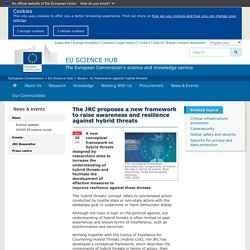
The 'hybrid threats' concept refers to coordinated action conducted by hostile state or non-state actors with the deliberate goal to undermine or harm democratic states. Altmaier: Green transport does not mean the end of the private car. Derrière la fusion Veolia-Suez, le rêve d’un Gafam français, par Marc Laimé (Les blogs du Diplo, 2 novembre 2020)
Il faut revenir au milieu des années 2000 pour prendre la mesure du virage stratégique initié par Suez.
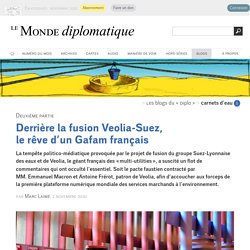
Elle-même étant confrontée, comme nous l’expliquions dans la première partie à propos de Veolia, à une contestation croissante de la « marchandisation de l’eau » et à la stagnation de ses activités historiques — symbolisées par les marchés désormais matures des grandes concessions de service public. 5G, la course à quoi ?, par Cyril Pocréaux & François Ruffin (Le Monde diplomatique, novembre 2020) «Pour que l’Union européenne continue de faire la course en tête, j’ai lancé sans attendre une initiative afin d’accompagner et d’accélérer nos efforts de recherche en Europe sur la 6G (1). » Quelle est donc la priorité de M.
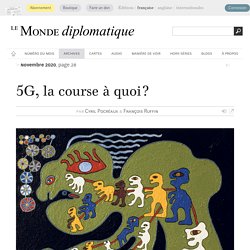
Thierry Breton, l’ancien patron de France Télécom, à peine nommé commissaire européen au marché intérieur ? The AI Company Helping the Pentagon Assess Disinfo Campaigns. Cybersecurity Threats Call for a Global Response. EU targets Big Tech with ‘hit list’ facing tougher rules. Booking.com hekelt Europees plan hardere aanpak big tech. 26 oktober 2020 Vandaag om 15:32.

Welcomes ambition for an open, collaborative European cloud; applies to join GAIA-X - DIGITALEUROPE. Podcast: How democracies can reclaim digital power. Technology companies provide much of the critical infrastructure of the modern state and develop products that affect fundamental rights.
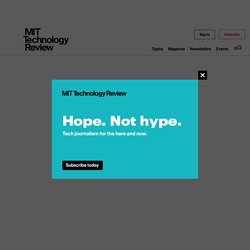
Search and social media companies, for example, have set de facto norms on privacy, while facial recognition and predictive policing software used by law enforcement agencies can contain racial bias. In this episode of Deep Tech, Marietje Schaake argues that national regulators aren’t doing enough to enforce democratic values in technology, and it will take an international effort to fight back. Schaake—a Dutch politician who used to be a member of the European parliament and is now international policy director at Stanford University's Cyber Policy Center—joins our editor-in-chief, Gideon Lichfield, to discuss how decisions made in the interests of business are dictating the lives of billions of people. Mainstream media is the biggest amplifier of White House disinformation. Benkler’s team just published its study, which examines the president’s disinformation campaign against mail-in votes and details the methods—and people—he’s using to accomplish his goals.
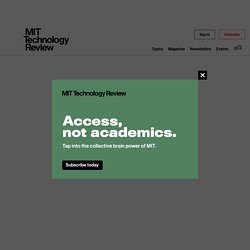
The findings found that some of the biggest names in American mass media and the political elite are primarily responsible, and that social media plays only a secondary role. The findings run contrary to the popular idea that it’s foreign troll factories doing the worst disinformation dirty work. The study examined 55,000 media stories, 5 million tweets, and 75,000 Facebook posts. #Algorithms4Consumers - EU2020 - EN. Policy guidelines from the European Commission 2019-2024 show where consumer policy in the digital world is heading in the coming years at European level.
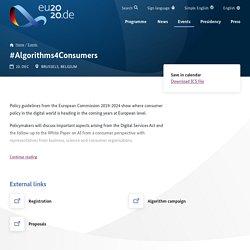
Policymakers will discuss important aspects arising from the Digital Services Act and the follow-up to the White Paper on AI from a consumer perspective with representatives from business, science and consumer organisations. The Executive Director of the German Federation of Consumer Organisations, Klaus Müller, and the State Secretary of the Ministry of Consumer Protection of Baden-Württemberg, Friedlinde Gurr-Hirsch, cordially invite you to the Representation of the State of Baden-Württemberg to the European Union at 11.30. Klaus Müller is a member of the Data Ethics Commission of the Federal Republic of Germany. Eyeing extraterrestrial threats, NATO to set up new space centre in Germany. NATO defence ministers on Thursday (22 October) are expected to approve a plan to create a new space centre at the alliance’s Air Command in Ramstein, Germany, in response to growing concerns over protecting satellite and navigation assets from enemy interference.

The plans were first reported earlier on Monday by German press agency DPA and the daily Süddeutsche Zeitung. Privacy International & La Quadrature du Net: the latest on data retention in the name of national and public security - Part 2 - CITIP blog. UK, French and Belgian courts referred questions to the Court of Justice of the EU (CJEU) on national legislation imposing upon providers of electronic communications services (ESPs) the obligation to generally and indiscriminately retain or transmit to competent authorities personal data, for the purposes of safeguarding national and public security and combating crime.
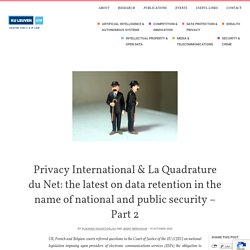
This blogpost, divided in three parts, describes and discusses the respective Privacy International and La Quadrature du Net rulings, delivered by the CJEU on 6 October 2020. Following the first part of this blogpost which analysed Privacy International and the first questions in La Quadrature du Net, the second part of this blogpost discusses the remaining questions raised in La Quadrature du Net, which relate primarily to different practices of retention, analysis and collection of personal data. On preventive and expedited data retention On automated analysis and real-time collection. Inbox (1,100) - aidaponce - Gmail. 5G and future networks. VTT is an innovation partner for developing world-class communication network solutions for the vertical industry domain.

We do research and development for communication networks and our strengths lie in vertical industry understanding. The vertical industry areas such as automotive, manufacturing, health and wellbeing, energy, transport, public safety, critical infrastructures and smart cities, will benefit from the new communication technologies, through enhanced reliability, performance and energy consumption. By utilizing the latest communication technology solutions, companies can ensure the undisrupted operation of telecommunication networks and improve the reliability of their systems.
This allows service providers to ensure that the end-user experience is smooth and of high quality. We focus on intelligent network management solutions, measuring quality of service and utilizing big data for network management. Building a European Data Infrastructure - Virtual Session. 20200724 edpb faqoncjeuc31118. 5G and Europe´s recovery.
Amazon introduces Amazon One, a way to pay with your palm when entering stores. In the middle of a pandemic when customers are often wearing plastic gloves to stores alongside their face masks, Amazon’s physical retail team is introducing a new biometric device that will allow shoppers to pay at Amazon Go stores using their palm. The company on Tuesday introduced its purportedly “contactless” Amazon One, a scanner of sorts where you’ll first insert your credit card, then hover your palm over the device to associate your palm signature with your payment mechanism. Once your card is on file, you’ll be able to enter the store in the future just by holding your palm above the Amazon One device for a second or so.
Leading multilateral efforts to address tax challenges from digitalisation of the economy. 09/10/2019 - Today the OECD Secretariat published a proposal to advance international negotiations to ensure large and highly profitable Multinational Enterprises, including digital companies, pay tax wherever they have significant consumer-facing activities and generate their profits. The new OECD proposal brings together common elements of three competing proposals from member countries, and is based on the work of the OECD/G20 Inclusive Framework on BEPS, which groups 134 countries and jurisdictions on an equal footing, for multilateral negotiation of international tax rules, making them fit for purpose for the global economy of the 21st Century. The proposal, which is now open to a public consultation process, would re-allocate some profits and corresponding taxing rights to countries and jurisdictions where MNEs have their markets.
For more information on the OECD/G20 BEPS Project, see: www.oecd.org/tax/beps/. Episode 76: If You Want to Be More Productive, Cut… Evan Sharp The year is 2009. It’s the end of the year. I’m in New York city studying architecture in graduate school at Columbia University, and I’m really broke and, you know, going into debt for school. I get connected to this guy, Ben Silverman, who, you know, we connect over email and has a lot of the same passions. A digital euro is on its way. Nous sommes tous des mutants, par Bernard Dujon (Le Monde diplomatique, juillet 2017)
«Êtes-vous pour ou contre ? » Dans le domaine de la génétique, et plus particulièrement celui des modifications dirigées des génomes, cette question-couperet supplante souvent les autres. Elle se pose avec une insistance plus stridente encore depuis la mise au point de nouveaux outils moléculaires, appelés Crispr, qui permettent de couper, d’éliminer ou de remplacer des séquences bien précises du génome avec facilité.
En théorie, ces méthodes ouvrent des champs d’application illimités. Mais peut-on vraiment savoir ce qu’il faut en penser avant de comprendre ce dont il s’agit ? Modifier un génome consiste à remplacer de façon ciblée un gène ou un fragment de gène par un élément — un morceau d’ADN — destiné à le réparer ou, au contraire, à l’inactiver. Les outils moléculaires utilisés existent à l’état naturel ou proviennent de simples assemblages d’éléments naturels, car la nature ne se prive pas de remodeler les génomes. Bataille géopolitique autour de la 5G, par Evgeny Morozov (Le Monde diplomatique, octobre 2020)
Qui contrôlera les technologies d’Internet ? Covid-19 : les données incomplètes de Santé publique France compliquent le suivi de l’épidémie. Combien de personnes âgées sont réellement décédées du Covid-19 dans les maisons de retraite cet été ? La question travaille Jean-Marie Robine, chercheur à l’Institut national d’études démographiques (INED). A plusieurs reprises, il a constaté que Santé publique France (SPF), l’établissement chargé notamment de collecter les données relatives à la santé des Français, avait revu à la baisse le bilan des décès survenus en Ehpad. Human Brain Project Home. PPP projects. Open20070601120000. Visa contactless. Effective date: January 1, 2020 This notice explains Visa’s approach to cookies and other online data collection technologies.
When you visit our websites, use our mobile apps, engage with our online ads or emails, we collect information, using technologies such as cookies, pixel tags (also called web beacons), browser analysis tools and server logs. Each of these technologies is explained below. 1. How We Use Cookies. Data sovereignty and soft infrastructures are key enablers for the next phase of the European data economy. As underlined by the new European data strategy, the European Commission wants to make Europe fit for the digital age and unleash the full benefits of better data usage for everyone. Data is essential for the creation of new business models for data-driven innovations and services. However, there are two things standing in the way of access to sufficient data. One is a growing unwillingness to share data because of privacy and security concerns. Fair data economy. Sitra’s IHAN project builds a European data economy model, having taken its first steps in Finland. The set of values on which a fair data economy is based combines a human-centric approach, trust, a new sense of community and the principles of sustainable growth.
The aim is a human-driven European data market, where companies that use data responsibly and open-mindedly succeed with smart services. The fair data economy will benefit everyone. Data will be shared more freely between different parties. Trust in service providers will encourage individuals to share their data when the sharing is based on their consent. 35 proposals to make the European data strategy work. The new data strategy of the European Commission aims to make the EU a leader in a data-driven society. Creating a single market for data will allow it to flow freely within the EU and across sectors for the benefit of businesses, researchers and public administrations.
Data Spaces as Core of The European Data Strategy and Europe's Digital Future - International Data Spaces Association. To build European Data Spaces common design principles are needed, for which IDS is a very good fundament. The list of required measures includes the following: IDSA is connected to many relevant initiatives across the globe including BDVA, FIWARE, the Industrial Internet Consortium IIC, the Industrial Value Chain Initiative, and the Plattform Industrie 4.0. IDSA and its member organizations participate in more than 20 research projects, mainly in the EU Horizon 2020 program and on national level.
Shaping Europe’s digital future. What is 5G? 4G LTE vs 5G, Speed & More. And the 5G challenge. The 5G controversy came to a head in early 2019. 5G: everything you need to know. 5G networks are the next generation of mobile internet connectivity, offering faster speeds and more reliable connections on smartphones and other devices than ever before. End-to-End 5G. 5G Observatory – Tracking 5G developments.
Shaping Europe’s digital future. The European 5G Observatory monitors market developments and preparatory actions taken by industry stakeholders and Member States in the context of 5G roll-out in Europe and beyond. Shaping Europe’s digital future. Future Connectivity Systems (Unit E.1) Shaping Europe’s digital future. Machine-to-Machine, Machine-2-Machine (M2M) Shaping Europe’s digital future. International Cooperation on 5G. Vision Papers & Roadmaps ‹ 5G-PPP. More than smartphones: White paper shows how 5G will transform EU manufacturing, health, energy, automotive, media & entertainment sectors.
Shaping Europe’s digital future. What is 5G? The Complete Guide to When, Why, and How. Combat 5G COVID-19 fake news, urges Europe. EDMO – United against disinformation. Social media firms fail to act on Covid-19 fake news. Journalism, 'Fake News' and Disinformation: A Handbook for Journalism Education and Training. Disinformation, Misinformation, and Fake News in Social Media - Emerging Research Challenges and Opportunities. Tackling online disinformation. ICO’s final report into Cambridge Analytica invites regulatory questions. Snapchat has turned London into an augmented reality experiment. Facebook Busts Russian Disinfo Networks as US Election Looms. ALERT! Hackers targeting IoT devices with a new P2P botnet malware.
El Salvador, Guatemala, Honduras and Nicaragua: so far from God, so close to the United States - Equal Times. Can digital blockchain technology improve working conditions in the Global South? - Equal Times. Researchers Unravel Genome In Three-dimensional Space. 3D Printed 'Invisible' Fibers Capable Of Sensing Sound, Breath & Cells.
Hackers Listen In on What Synthetic DNA Machines Are Printing. TechCrunch fait désormais partie de Verizon Media. Ex-antics - Google, antitrust and how best to regulate big tech. US Army says new mixed-reality goggles will make dogs better in battle. Great Britain: creation of the first union for the tech sector - Planet Labor. Telefonica: global agreement on the digital disconnection came at just the right time - Planet Labor. Global: The coming global technology fracture. Use Connectivity to Strengthen Multilateral Cooperation in the EU’s Neighbourhood - Egmont Institute. Explainer: Why Social Media Has Potential to Change. IPOL ATA(2020)652750 EN. The mirage of the end of work. A global struggle: worker protest in the platform economy.
The digital services act package. Technological revolutions and societal transitions. Covid-19 contact-tracing apps: how to prevent privacy from becoming the next victim. Japans Society 5.0 Going Beyond Industry 4.020190516 80383 3s4apn. The 7 Biggest Technology Trends That Will Transform Telecoms In 2020. 5G, blockchain and IoT: what does the future of telecommunications look like?